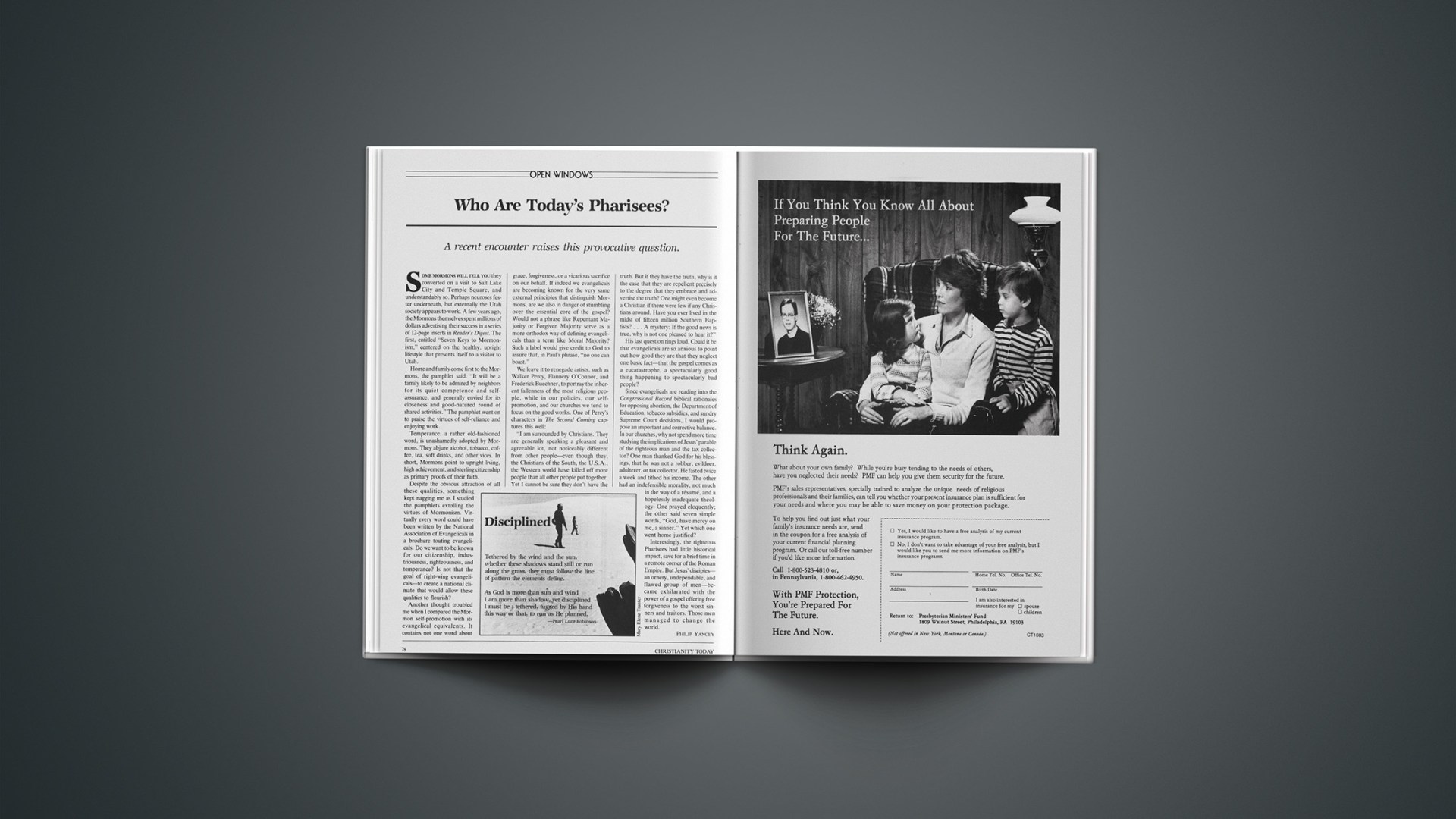A recent encounter raises this provocative question.
Some mormons will tell you they converted on a visit to Salt Lake City and Temple Square, and understandably so. Perhaps neuroses fester underneath, but externally the Utah society appears to work. A few years ago, the Mormons themselves spent millions of dollars advertising their success in a series of 12-page inserts in Reader’s Digest. The first, entitled “Seven Keys to Mormonism,” centered on the healthy, upright lifestyle that presents itself to a visitor to Utah.
Home and family come first to the Mormons, the pamphlet said. “It will be a family likely to be admired by neighbors for its quiet competence and self-assurance, and generally envied for its closeness and good-natured round of shared activities.” The pamphlet went on to praise the virtues of self-reliance and enjoying work.
Temperance, a rather old-fashioned word, is unashamedly adopted by Mormons. They abjure alcohol, tobacco, coffee, tea, soft drinks, and other vices. In short, Mormons point to upright living, high achievement, and sterling citizenship as primary proofs of their faith.
Despite the obvious attraction of all these qualities, something kept nagging me as I studied the pamphlets extolling the virtues of Mormonism. Virtually every word could have been written by the National Association of Evangelicals in a brochure touting evangelicals. Do we want to be known for our citizenship, industriousness, righteousness, and temperance? Is not that the goal of right-wing evangelicals—to create a national climate that would allow these qualities to flourish?
Another thought troubled me when I compared the Mormon self-promotion with its evangelical equivalents. It contains not one word about grace, forgiveness, or a vicarious sacrifice on our behalf. If indeed we evangelicals are becoming known for the very same external principles that distinguish Mormons, are we also in danger of stumbling over the essential core of the gospel? Would not a phrase like Repentant Majority or Forgiven Majority serve as a more orthodox way of defining evangelicals than a term like Moral Majority? Such a label would give credit to God to assure that, in Paul’s phrase, “no one can boast.”
We leave it to renegade artists, such as Walker Percy, Flannery O’Connor, and Frederick Buechner, to portray the inherent fallenness of the most religious people, while in our policies, our self-promotion, and our churches we tend to focus on the good works. One of Percy’s characters in The Second Coming captures this well:
“I am surrounded by Christians. They are generally speaking a pleasant and agreeable lot, not noticeably different from other people—even though they, the Christians of the South, the U.S.A., the Western world have killed off more people than all other people put together. Yet I cannot be sure they don’t have the truth. But if they have the truth, why is it the case that they are repellent precisely to the degree that they embrace and advertise the truth? One might even become a Christian if there were few if any Christians around. Have you ever lived in the midst of fifteen million Southern Baptists?… A mystery: If the good news is true, why is not one pleased to hear it?”
His last question rings loud. Could it be that evangelicals are so anxious to point out how good they are that they neglect one basic fact—that the gospel comes as a eucatastrophe, a spectacularly good thing happening to spectacularly bad people?
Since evangelicals are reading into the Congressional Record biblical rationales for opposing abortion, the Department of Education, tobacco subsidies, and sundry Supreme Court decisions, I would propose an important and corrective balance. In our churches, why not spend more time studying the implications of Jesus’ parable of the righteous man and the tax collector? One man thanked God for his blessings, that he was not a robber, evildoer, adulterer, or tax collector. He fasted twice a week and tithed his income. The other had an indefensible morality, not much in the way of a résumé, and a hopelessly inadequate theology. One prayed eloquently; the other said seven simple words, “God, have mercy on me, a sinner.” Yet which one went home justified?
Interestingly, the righteous Pharisees had little historical impact, save for a brief time in a remote corner of the Roman Empire. But Jesus’ disciples—an ornery, undependable, and flawed group of men—became exhilarated with the power of a gospel offering free forgiveness to the worst sinners and traitors. Those men managed to change the world.
Disciplined
Tethered by the wind and the sun,
whether these shadows stand still or run
along the grass, they must follow the line
of pattern the elements define.
As God is more than sun and wind
I am more than shadow, yet disciplined
I must be: tethered, tugged by His hand
this way or that, to run as He planned.
—Pearl Lunt Robinson










